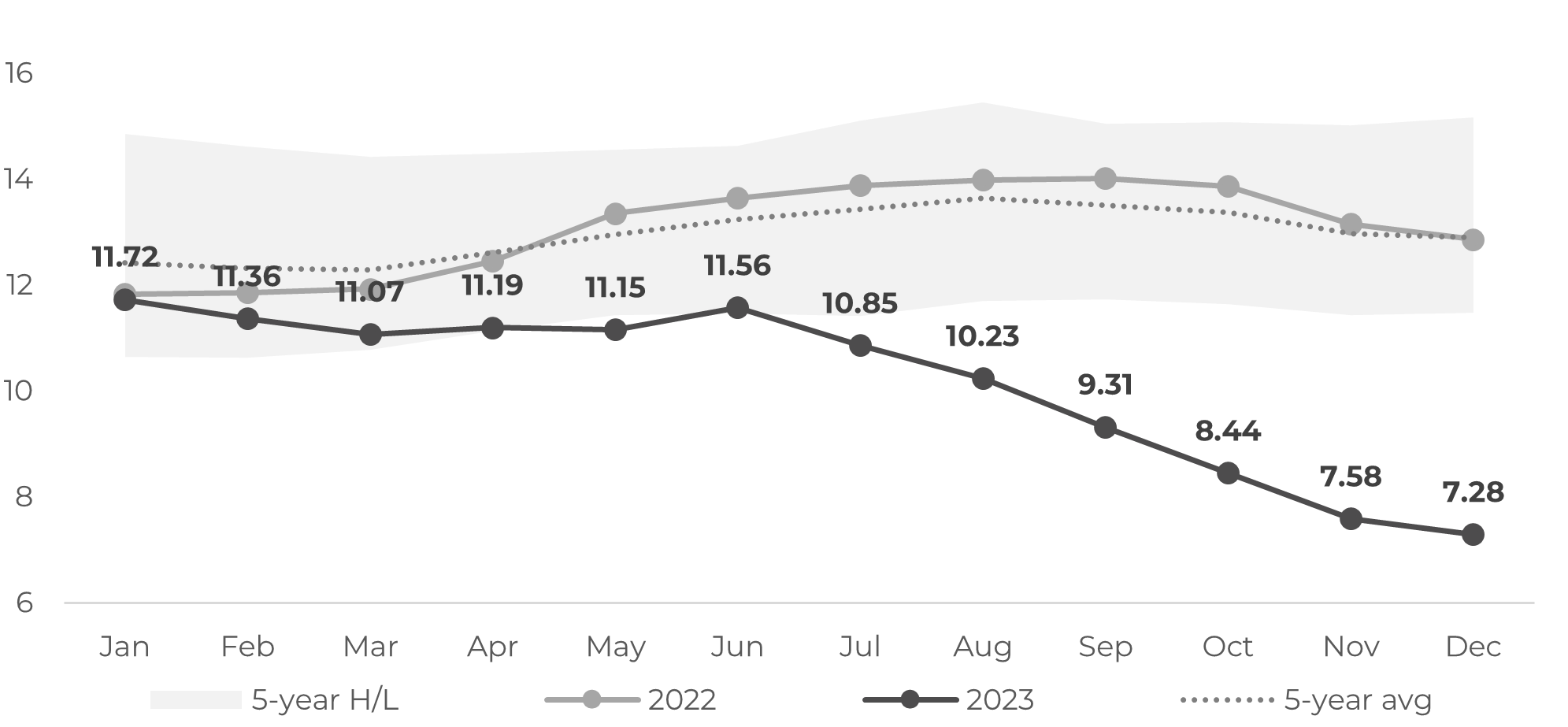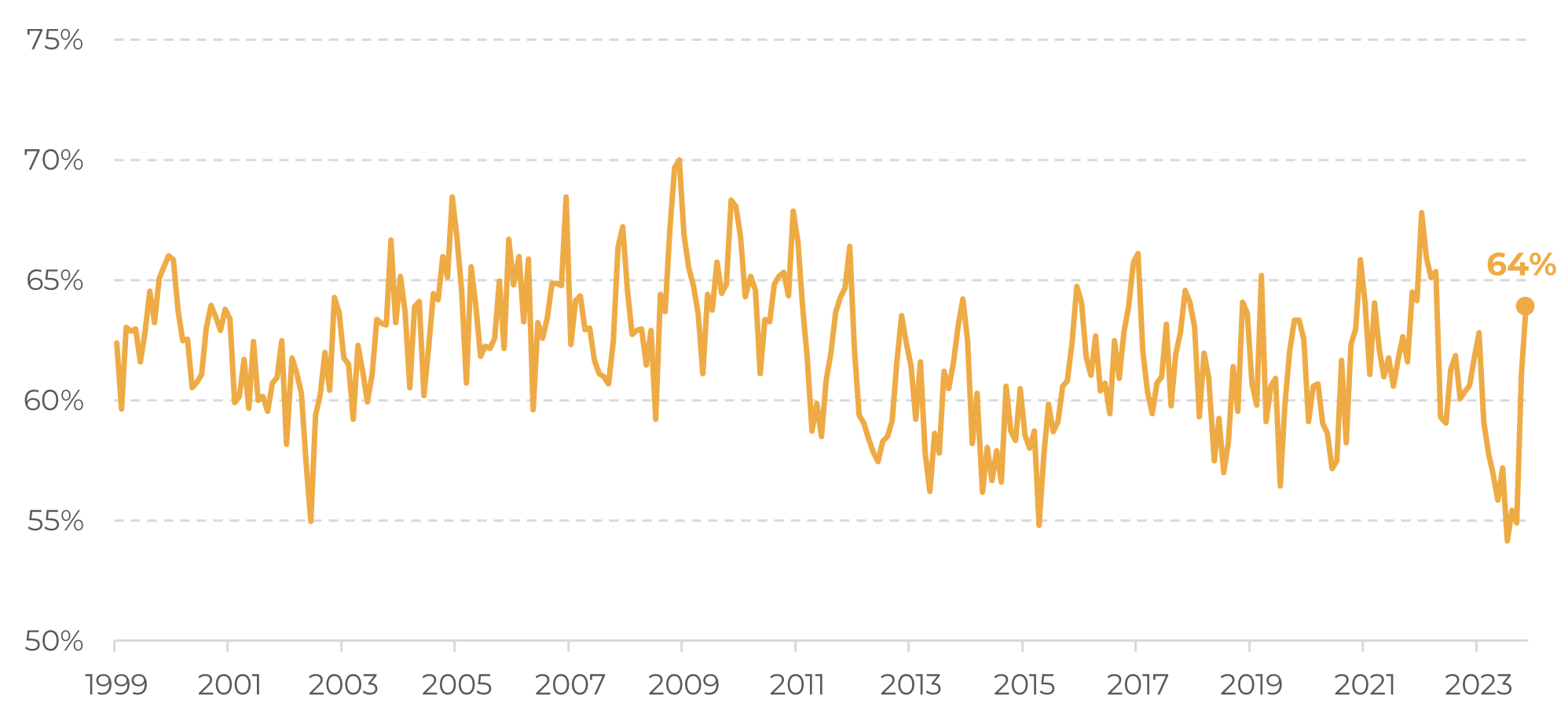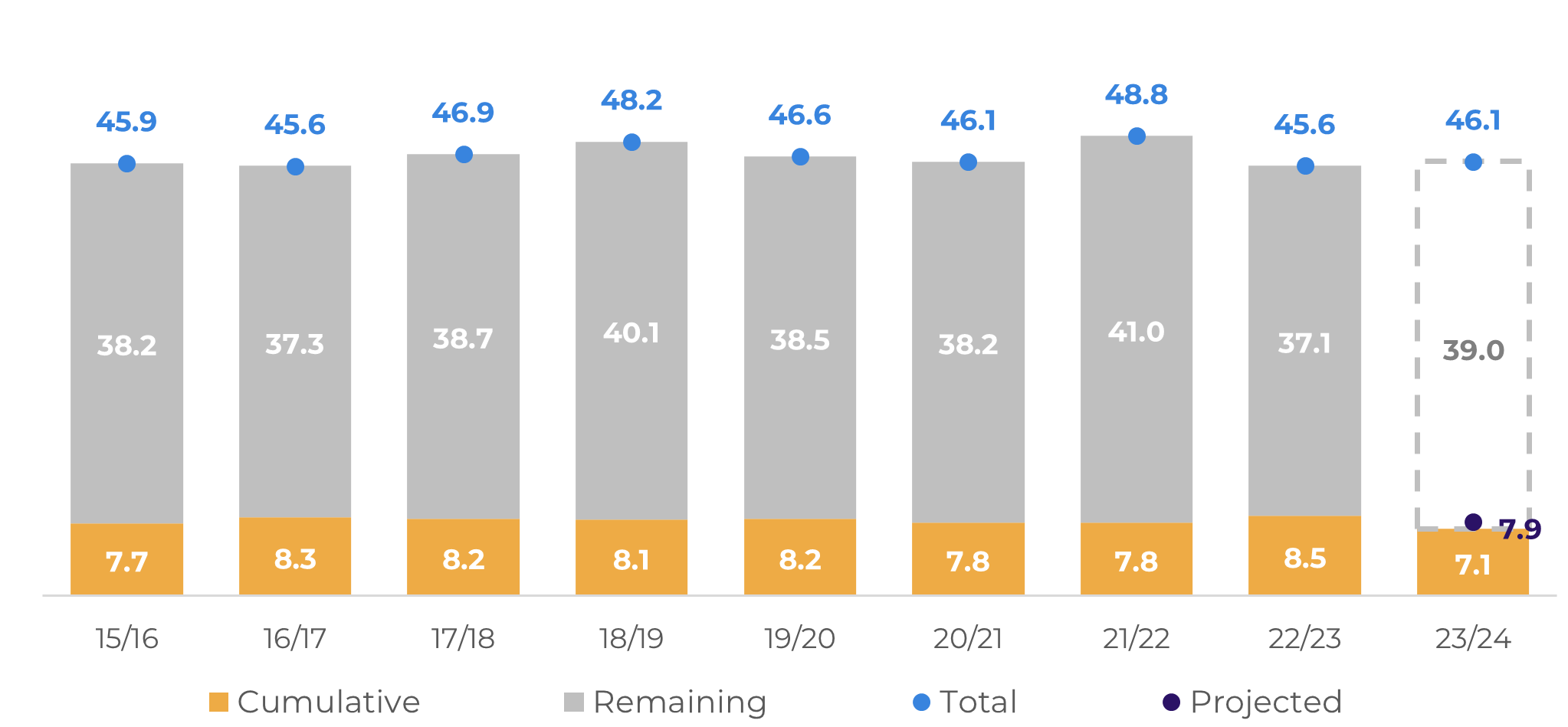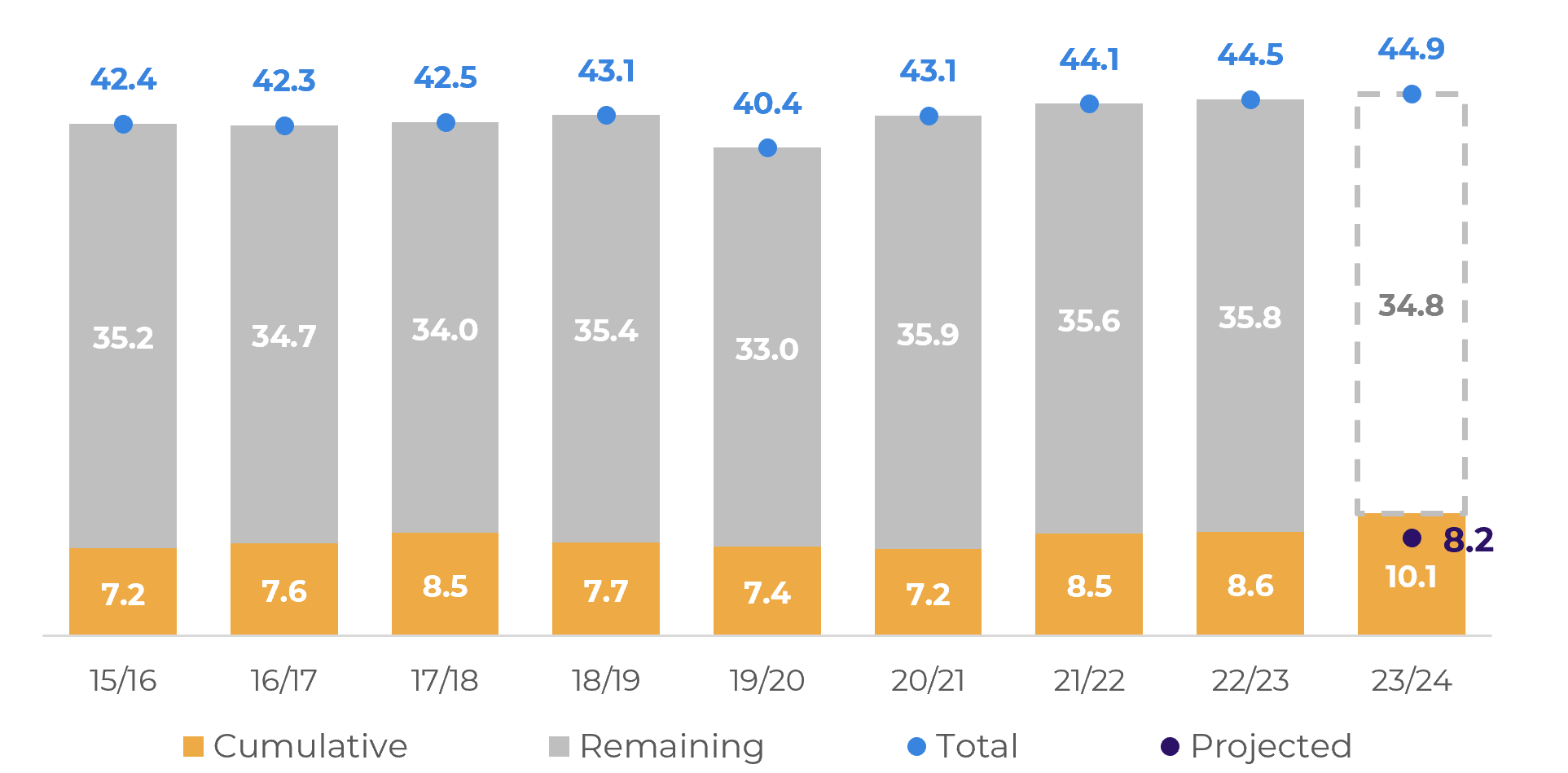
Feb 2
/
Natália Gandolphi
Coffee Weekly Report - 2024 02 02
Back to main blog page
- In June, the European Union enacted legislation targeting deforestation, mandating that imported products adhere to specific environmental standards.
- This regulatory development may account for the decrease in coffee stock levels, which hit a nadir of 7.28 million bags in December, covering only 8-10 weeks of EU consumption compared to the standard 15-16 weeks.
- The alteration in imported coffee patterns is evident in the increase to 64% arabica imports in November, up from 54% in July 2023. Cumulative EU coffee imports for the 23/24 period total 7.1 million bags, slightly below the anticipated 7.9 million.
- Although demand has surged to 10.1 million bags from 8.6 million last year, it is influenced by factors beyond market forces and warrants cautious consideration.
European Union Demand Analysis
At the end of June, the European Union approved a new set of legislative norms to combat deforestation – imported products need to certify that they are not linked to environmental damage. From that month onwards, the trend cannot be simply explained by slightly higher demand or impacts from high storage costs. Therefore, the stock withdrawal may be very well-connected to the new legislative rules in the bloc.
Stocks reached 7.28M bags in December, the lowest level in the available series (since December 2013). Currently, stocks can only cover about 8-10 weeks of consumption in the European Union, when, on average, the bloc carries the amount to cover roughly 15-16 weeks’ worth of roaster consumption.
It’s important to note that the trend in imported coffee continues to change. In November, roughly 64% of the total coffee imported by the European Union was arabica coffee, in contrast to the 54% low reported in July 2023 – which suggests that, while London remains as reference, that trend is only temporary.
Figure 1: ECF Stocks (M bags)

Source: European Coffee Federation
Figure 2: Share of Arabica Imports in Total – European Union (%)

Source: Eurostat
.
Cumulatively in 23/24, the European Union imported 7.1M bags – slightly lower than the 7.9M bags expected for the period, considering a 1% increase in imports to support a 1.5% increase in demand – however, it’s still early to affirm that this will last throughout the whole cycle.
In fact, in order to go back to normal stocks levels in the bloc, imports would need to ramp up in this cycle. Still, we highlight the argument from earlier in the report: even though stocks fell more than expected, likely due to the new deforestation regulation, that coffee may just have been reallocated.
For the cumulative figure in 23/24, apparent consumption results may also be still reflecting this trend: the bloc has reportedly consumed 10.1M bags, vs. 8.6M bags at the same period last year – which was a record. In this sense, demand figures are bullish, but should be considered carefully, since part of the movement is exogenous to the market demand itself.
Figure 3: European Union Coffee Imports (M bags)

Source: Eurostat
Figure 4: European Union Apparent Consumption (M bags)

Source: Eurostat, ECF, hEDGEpoint
In Summary
In June, the European Union approved legislation against deforestation, requiring imported products to certify certain environmental standards.
This may explain the stock withdrawal, reaching a low of 7.28M bags in December, covering only 8-10 weeks of EU consumption compared to the usual 15-16 weeks.
This may explain the stock withdrawal, reaching a low of 7.28M bags in December, covering only 8-10 weeks of EU consumption compared to the usual 15-16 weeks.
The shift in imported coffee trends shows 64% arabica imports in November, up from 54% in July 2023. Cumulative 23/24 EU coffee imports of 7.1M bags are slightly below the 7.9M expected.
While demand appears bullish, reaching 10.1M bags, up from 8.6M last year, it's influenced at the moment by factors beyond market consumption itself, and therefore, should be considered carefully.
While demand appears bullish, reaching 10.1M bags, up from 8.6M last year, it's influenced at the moment by factors beyond market consumption itself, and therefore, should be considered carefully.
Weekly Report — Coffee
Written by Natália Gandolphi
natalia.gandolphi@hedgepointglobal.com
natalia.gandolphi@hedgepointglobal.com
Reviewed by Lívea Coda
livea.coda@hedgepointglobal.com
www.hedgepointglobal.com
Disclaimer
This document has been prepared by hEDGEpoint Global Markets LLC and its affiliates ("HPGM") exclusively for informational and instructional purposes, without the purpose of creating obligations or commitments with third parties, and is not intended to promote an offer, or solicitation of an offer, to sell or buy any securities or investment products. HPGM and its associates expressly disclaim any use of the information contained herein that may result in direct or indirect damage of any kind. If you have any questions that are not resolved in the first instance of contact with the client (client.services@hedgepointglobal.com), please contact our internal ombudsman channel (ouvidoria@hedgepointglobal.com) or 0800-878-8408 (for clients in Brazil only).
Contact us
hedgepointhub.support@hedgepointglobal.com
ouvidoria@hedgepointglobal.com
Funchal Street, 418, 18º floor - Vila Olímpia São Paulo, SP, Brasil
Check our general terms and important notices.
This page has been prepared by Hedgepoint Schweiz AG and its affiliates (“Hedgepoint”) solely for informational and instructional purposes, without the purpose of instituting obligations or commitments to third parties, nor is it intended to promote an offer, or solicitation of an offer of sale or purchase relating to any securities, commodities interests or investment products. Hedgepoint and its associates expressly disclaim any use of the information contained herein that directly or indirectly result in damages or damages of any kind. Information is obtained from sources which we believe to be reliable, but we do not warrant or guarantee the timeliness or accuracy of this information. The trading of commodities interests such as futures, options, and swaps involves substantial risk of loss and may not be suitable for all investors. You should carefully consider wither such trading is suitable for you in light of your financial condition. Past performance is not necessarily indicative of future results. Customers should rely on their own independent judgement and/or advisors before entering in any transaction.Hedgepoint does not provide legal, tax or accounting advice and you are responsible for seeking any such advice separately.Hedgepoint Schweiz AG is organized, incorporated, and existing under the laws of Switzerland, is filiated to ARIF, the Association Romande des Intermédiaires Financiers, which is a FINMA-authorized Self-Regulatory Organization. Hedgepoint Commodities LLC is organized, incorporated, and existing under the laws of the USA, and is authorized and regulated by the Commodity Futures Trading Commission (CFTC) and a member of the National Futures Association (NFA) to act as an Introducing Broker and Commodity Trading Advisor. HedgePoint Global Markets Limited is Regulated by the Dubai Financial Services Authority. The content is directed at Professional Clients and not Retail Clients. Hedgepoint Global Markets PTE. Ltd is organized, incorporated, and existing under the laws of Singapore, exempted from obtaining a financial services license as per the Second Schedule of the Securities and Futures (Licensing and Conduct of Business) Act, by the Monetary Authority of Singapore (MAS). Hedgepoint Global Markets DTVM Ltda. is authorized and regulated in Brazil by the Central Bank of Brazil (BCB) and the Brazilian Securities Commission (CVM). Hedgepoint Serviços Ltda. is organized, incorporated, and existing under the laws of Brazil. Hedgepoint Global Markets S.A. is organized, incorporated, and existing under the laws of Uruguay. In case of questions not resolved by the first instance of customer contact (client.services@Hedgepointglobal.com), please contact internal ombudsman channel (ombudsman@hedgepointglobal.com – global or ouvidoria@hedgepointglobal.com – Brazil only) or call 0800-8788408 (Brazil only).Integrity, ethics, and transparency are values that guide our culture. To further strengthen our practices, Hedgepoint has a whistleblower channel for employees and third-parties by e-mail ethicline@hedgepointglobal.com or forms Ethic Line – Hedgepoint Global Markets.Security note: All contacts with customers and partners are conducted exclusively through our domain @hedgepointglobal.com. Do not accept any information, bills, statements or requests from different domains and pay special attention to any variations in letters or spelling, as they may indicate a fraudulent situation.“HedgePoint” and the “HedgePoint” logo are marks for the exclusive use of HedgePoint and/or its affiliates. Use or reproduction is prohibited, unless expressly authorized by HedgePoint. Furthermore, the use of any other marks in this document has been authorized for identification purposes only. It does not, therefore, imply any rights of HedgePoint in these marks or imply endorsement, association or seal by the owners of these marks with HedgePoint or its affiliates.
We have updated our Terms & Conditions to reflect improvements to our platform, data handling practices, and the overall experience we provide to our clients.
To continue using the Hedgepoint HUB, please review and accept the updated terms.

